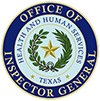OIG opens investigations after dental fraud detection operations
The majority of Texas Medicaid dental providers take pride in their work and deliver excellent care to their patients. Those who try to cheat the system and fail to maintain a standard of care are finding it harder to hide.
Advanced technology and experienced staff help the OIG uncover potential fraud, waste and abuse faster than ever. An OIG Fraud Detection Operation (FDO) reviews volumes of data to reveal providers who appear as statistical outliers among their peers. Investigators then evaluate additional records and information to determine whether an outlier’s status is attributable to possible fraud, waste, abuse or other another explanation. Providers are required to provide the records requested by OIG investigators.
In July 2020, an FDO focused on questionable dental billing practices analyzed claims data from more than 5,500 providers. Outliers in the Houston area were identified based on billing patterns for general dentistry services.
What does a suspicious claim look like?
Mistakes can happen in any practice. The OIG’s claims analysis identifies outliers or behavior that may indicate FWA that needs a closer examination. For instance, providers are flagged for a closer look if they bill:
- A high number of procedure codes performed during a single visit without billing for sedation or general anesthesia.
- Tooth-specific procedures performed on teeth that per ADA should have already been shed.
- A high average number of resin restorations performed per client per visit.
The FDO data analysis revealed a provider who billed for a client with 18 procedure codes, including resin restorations, crowns, pulpotomies and tooth removal — all performed on the same date of service and without anesthesia. Another claim involved a three-year-old client with 31 procedure codes, including five resin restorations, crowns, and pulpotomies.
Opening investigations
As a result of the FDO, the OIG opened investigations on four providers. Dental records were then requested to verify if:
- Dental services were requested/received by client.
- Records contain supporting documentation for services billed to Medicaid.
- The client has valid preoperative radiographs.
The investigations for the four providers are ongoing.

